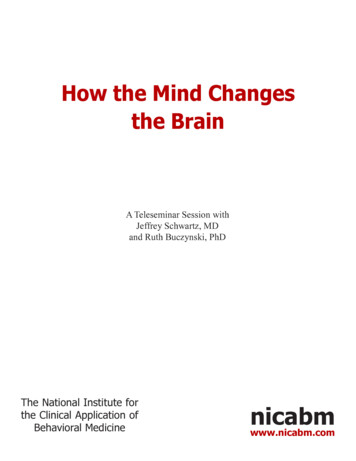
Transcription
How the Mind Changesthe BrainA Teleseminar Session withJeffrey Schwartz, MDand Ruth Buczynski, PhDThe National Institute forthe Clinical Application ofBehavioral Medicinenicabmwww.nicabm.com
How the Mind Changes the BrainHow the Mind Changes the BrainContents:The Interaction between the Mind and the Brain . 3What Quantum Physics Can Teach usabout Neuroplasticity . 7Self-directed Neuroplasticity - How We Can Teach Patientsto Change Their Brains and Their Behaviors . 15Why Mindfullness Practices Can Help Patients with OCDChange the Wiring of Their Brains . 17A Four Step Regimen for Treating Patients with OCD . 20A complete transcript of a Teleseminar Sessionfeaturing Jeffrey Schwartz, MD and conducted by Ruth Buczynski, PhD of NICABMThe National Institute for the Clinical Application of Behavioral Medicinewww.nicabm.com
How the Mind Changes the BrainHow the Mind Changes the Brainwith Dr. Ruth Buczynskiand Dr. Jeffrey SchwartzDr. Buczynski: Hello everyone. I want to welcome everyone to the call tonight. I amDr. Ruth Buczynski, a licensed psychologist in Connecticut and President of the NationalInstitute for the Clinical Application of Behavioral Medicine. People are calling in fromall over the United States and from many, many parts of the world. Welcome, we areglad you are here.This is another of our Wednesday evening calls on the brain and neuroplasticity. Wehave a great speaker today. Someone who is one of the most eminent thinkers onneuroplasticity, but just before I introduce him, let me just say, welcome again.Our guest is Dr. Jeffrey Schwartz. He is a physician and the author of The Mind andthe Brain: Neuroplasticity and the Power of Mental Force and also of Brain Lock: FreeYourself from Obsessive-Compulsive Disorder. So, welcome Jeffrey.Dr. Schwartz: Yes, hi.Dr. Buczynski: It’s great to have you on the call.Dr. Schwartz: Nice to be here.Dr. Buczynski: Jeffrey is a research psychiatrist at UCLA School of Medicine, and hehas been studying this for many, many years. As those of you who have been followingthis work know, the brain has kind of “taken off” in the last few years, but Jeffrey hasbeen studying this for much, much longer. So let’s begin, and to do that, I’d like to startwith how the mind changes the brain. What’s the interaction as you see it between themind and the brain and how does the brain get changed by the mind?The Interaction between the Mind and the BrainDr. Schwartz: I’m happy you’re not starting with one of the easy questions! To reallyexplain that in a way that has scientific credibility, it is important to say a little bit aboutthe background work so I’ll give a very short summary of that.The National Institute for the Clinical Application of Behavioral Medicinewww.nicabm.com
How the Mind Changes the BrainFor quite a few years as you said, starting in the mid-eighties, we started with obsessivecompulsive disorder and in the process of doing that (maybe later in the interview you’llask me about that because I can give more details about this research), but the key wasgetting people to change their understanding of what we had good scientific evidence tobelieve: that intrusive thoughts and urges, obsessive thoughts, and compulsive urges werecaused by a brain problem and very likely to be genetically inherited. And it certainly hasturned out in the subsequent years.So we had people who had what we knew from our prior work in the mid 80s, a brainrelated problem that was causing these obsessive-compulsive symptoms their unwantedintrusive thoughts, compulsive urges. I basically had a notion (based on at that timeand very strongly influenced by a lot of experience that I had already developed indoing old school classical Buddhist meditation in the Theravada tradition, as well as myupbringing as a Jewish person and even then, to some degree, also being influenced bymy understanding of Christianity) that getting people to focus their attention with beliefthat they are not just what their brain is. It was - my hypothesis – to get them to think andact differently and when they did that, they would change how their brain worked.So basically, focusing their attention differently changed how their brain worked. Andthat hypothesis turned out to be substantiated by a series of studies that we did usingbrain imaging, especially in the early and mid 90s.By the late 90s, I was really interested in trying toput this on a theoretical foundation, because oneof the problems that you have and we still havein getting scientific establishment, scientific elitesto believe that people could actually change howtheir brain works just by focusing their attentiondifferently, and to do this, you have to make acase for something that is basically non-material,which is the focus of your attention.“Basically, focusing theirattention differentlychanged how their brainworked.”I mean, your attention is not a material thing. It’s a mental thing and in the accepted – I’lluse the word – dogmas of science, the science of our era deeply believes that all causationis material causation. That if something happens, something material must have caused itto happen.So if you want to make the case that there are other ways to change the brain that arebased on just focus of attention, you have to begin to make the case that non-materialThe National Institute for the Clinical Application of Behavioral Medicinewww.nicabm.com
How the Mind Changes the Brainfactors can affect material factors. So that’s the backdrop of what you have to have toexplain, to begin to answer the question that you asked me in a scientifically meaningfulway in our era.Dr. Buczynski: I wanted to just ask you because we’ve got a lot of practitioners onthe call: What have you found to be the best way to convince patients that their attentionaffects their brain?Dr. Schwartz: That’s an interesting cultural question because it turns out thatconvincing regular people, convincing sufferers, convincing people who aren’t, youknow, trained in the culture of science is not difficult because people intuitively, we allintuitively believe, in fact, that materialism is not a philosophy that people really believe.I mean that’s one of the deep ironies .scientists don’t believe it when they walk out oftheir laboratory nobody lives like they believe it. Everybody believes that they have acapacity to focus their attention and how they focus that attention makes a difference inhow they live their lives.And I mean at some level, that’s going to involve biology. So the clinical side has neverbeen difficult in that way, but I won’t deny that having brain images – I mean this is backin the day I mean brain images have always been a powerful thing for people to beconvinced by. I mean even in the early days.Now it has been around for so long there are now whole scientific studies that you canuse to convince people of things that “don’t make any sense” by showing them brainimaging.Brain imaging is convincing in ways that areproblematic, actually. But it turns out that – thisis back like I am saying in the late 80s, whenyou could show people brain imaging thisentire story is actually told in the introductionin chapter two of my book The Mind and theBrain. Not that I am trying to give a plug forthe book, per say, but I mean if you want toknow the story, it’s in that book of how it allhappened.“So if you want to make thecase that there are otherways to change the brainthat are based on just focusof attention, you have tobegin to make the case thatnon-material factors canaffect material factors.”Dr. Buczynski: Go ahead and tell us.The National Institute for the Clinical Application of Behavioral Medicinewww.nicabm.com
How the Mind Changes the BrainDr. Schwartz: Here’s the point: you could show someone a picture that said thisisn’t really your thought; it’s just your brain that is causing that thought. That brainpicture makes it easier for them to believe: “Hey, this isn’t really me. It’s an obsessivecompulsive disorder.”“There are now whole scientificstudies that you can use toconvince people of thingsthat ‘don’t make any sense’ byshowing them brain imaging.”It becomes extremely helpful and importantto get the person who basically knowsthat this bothersome intrusive thought andurge is not really them. They know it isnot really true. The problem is that it isso bothersome, and you can use this braininformation to explain to people why it isso bothersome and even more important,why it doesn’t go away. Of course, part ofthe reason why it is so bothersome is that itdoesn’t go away.Dr. Buczynski: Right.Dr. Schwartz: So then you can get people to begin to get a firmer grasp on this true factthat “this isn’t me. It’s just my brain or it’s just this condition, OCD, that’s causing this tohappen.” And that helps them to understand what it is and that helps them to focus theirattention differently.With OCD patients, for example, and for other anxiety, depression issues, that kind ofinformation can really be helpful and the reason why it is helpful is that it enhancespeople’s ability to not identify with the thoughts and feelings they are having that arecausing them problems. Now obviously, you canuse cognitive techniques to enhance that, and then“Don’t believe everythingyou get basically a positive synergy between theyou think. Don’t act onbrain imaging and the cognitive training, but whateverything you feel.”you don’t get is people saying, “Well, how can Ichange my brain with my mind?”Well, you get that to some degree, but once you say, “Well, we have done these scientificexperiments, you know, and you can do it. Here are the pictures.” I mean, that’s whyI put the pictures on the back of the book Brain Lock, to show people, well, you know,actually these studies have been published. You can do it. Then, they believe it fairlyreadily and I guess that’s one of the take home messages we have been using lately, justin the last couple of years.The National Institute for the Clinical Application of Behavioral Medicinewww.nicabm.com
How the Mind Changes the BrainI have never actually put this in any of the books yet. I am working on another one rightnow, actually, with the Chief Resident in Psychiatry, Rebecca Gladding, who just finishedlast year. I am very fortunate to have an extremely good co-author she was, in fact, myco-therapist for the OCD group for over a year during the latter part of her psychiatryresidency and so one of the phrases that we started to use that actually came from peoplein the group itself is this: “Don’t believe everything you think.”That actually is a good one-liner, you know. I mean, it’s like a bumper sticker. It’sactually very helpful a way of thinking that your brain sends you the information, butyou need an evaluative function of your mind to say whether it is true or not is a verygood way of thinking. Don’t believe everything you think. Don’t act on everything youfeel. There is – you know – there was one false thing that came out of the 60s and therewere many false things that came out of the 60s, but maybe the most false thing that cameout of the 60s was this line, “If it feels good, do it.” Not a good idea, actually.Dr. Buczynski: I want o get back to OCD, but before we do I want to travel arounda little bit before we delve down into that more and you have written a little bit aboutquantum physics and what quantum physics teaches us about neuroplasticity. Can we.?What Quantum Physics Can Teach Us about NeuroplasticityDr. Schwartz: Yes, but now we are back to the order that I thought that we were goingto use in the first place that’s the question we need to address before I can answer yourfirst question.Dr. Buczynski: This is my fault entirely. I’m sorry.Dr. Schwartz: I mean it’s all right. It’snot an issue of fault How could youpossibly know that? But we want toanswer a very difficult question withina rigorous scientific context I wantthe listeners to really be aware of this. Imean, you can be acting within a rigorousscientific context which we are very muchdoing and making very concerted efforts,too – when we use this quantum approachto understand how the mind can changethe brain and still be very much at oddswith the scientific establishment.“We use this quantum approachto understand how the mind canchange the brain and still be verymuch at odds with the scientificestablishment.”The National Institute for the Clinical Application of Behavioral Medicinewww.nicabm.com
How the Mind Changes the BrainAnd the reason for that is because there is not good agreement at all in the scientificestablishment about what the meaning of quantum mechanics is. Quantum mechanics isthe interpretation of quantum mechanics is a very controversial area and so I’ve beenworking with a physicist named Henry Stapp for about a dozen years now.Dr. Buczynski: Would you say the last name again? Henry.Dr. Schwartz: Stapp. So there is a whole bunch about Henry and the mind and thebrain and you could look him up on Wikipedia. In fact, I would advise you to – I meanhis page on Wikipedia is helpful because on the bottom of his page is a link to all thepapers that he has written. He is extremely good about that. He’s at UC Berkeley. He’sat the Lawrence Berkeley Laboratory. Henry Stapp Again, if you put Henry Stapp intoWikipedia, you’ll get his page and then on the bottom of it there is a link to all his papers.I guess that I will add in that I have a website, too, that is not as complete as Henry’s.It’s almost as complete as Henry’s, but it has more of a lay orientation and that can bereached by going to jeffreymschwartz.com.So anyway, when I was doing this work with Henry, the big advantage – and there aremany big advantages to working with Henry, but one of them is that he worked closelywith two of the main founders of quantum mechanics: Werner Heisenberg and WolfgangPauli.Henry, who is now about to turn 82, is very close to the original, orthodox and still theonly interpretation of quantum mechanics that actually gets used in the real world. I’mbegging the question entirely of what we mean by the real world, but I mean whenscientists go to their laboratories, and you know, use quantum mechanics which they doevery day, all the time. This is how all scientists who do electronics work, you know, usequantum mechanics.And when they do, they are using the orthodox quantum mechanics of basicallyHeisenberg, Pauli, Max Born, and a handful of the other great founders.So, working with Henry, who has completely mastered over many, many decades thatapproach to doing quantum mechanics, is a big advantage because it puts us on the firmground of being able to claim that Yes, this is really rigorous science that we are using.But I still want to contextualize for the listeners, that even so, when you start to applyquantum mechanical reasoning to things that are outside of the kinds of things thatThe National Institute for the Clinical Application of Behavioral Medicinewww.nicabm.com
How the Mind Changes the Brainelectrical engineers do or very serious theoretical physicists do, etc., you get into verybig disagreements about how to apply the understandings of quantum mechanics to thereality that comes outside of very, very technical and scientific questions.So when we started to use that kind ofreasoning to apply it to the relationship“The way you observe realitybetween the mind and the brain, I’m justactually influences how thetrying to contextualize for people whyreality itself expresses itself.”you haven’t well yes, it actually was onthe front page of the Wall Street Journal.And yes, there actually was an article inthe New York Times about it so it’s not like we didn’t get decent media coverage butthe scientific establishment is very committed to pre-quantum materialist thinking andso there is a real cultural resistance especially at the level of biology and even morespecifically at the level of neuroscience, which are the fields we are operating in.But I imagine most of the listeners have heard that in the field of evolutionary biology,there are applications of Darwinism that are basically materialism applied. So at thelevel of establishment science, especially in the biological sciences, but not only in thebiological sciences, there is a real commitment to materialism and pre-quantum thinkingeven though quantum mechanics has been an established scientific truth, as much as youcan use the word truth in science for over a century now.So yes, there is this very, very important cultural mismatch and one of the ways thatmismatch really expresses itself is through this question: how do you apply quantummechanical reasoning to biology? And now I will actually answer the question you askedme.Dr. Buczynski: Okay.Dr. Schwartz: . but I will also say that that little editorial I just gave is in many ways asimportant as the answer to the question. Because it helps you understand why the answerto the question which sounds like common sense to most people is still considered very,very controversial inside the scientific establishment.Well, there is a well recognized law in quantum physics. The law itself is notcontroversial. How to apply the law can get controversial. But the law itself is notcontroversial and that law is called Quantum Zeno Effect and of course, Henry knewabout this. I did not. Actually, I know not that much about quantum mechanics. HenryThe National Institute for the Clinical Application of Behavioral Medicinewww.nicabm.com
10How the Mind Changes the Brain“This Quantum Zeno Effect couldactually explain what I was doing toget the patients to change their ownbrains.“is not great on the brain and I’mcertainly not great on quantummechanics, but it just goes to showyou when you put two people whoknow quite a bit about their relativesubject matters together, you can getreal interesting things happening.So when Henry and I, over years, and this took years of working together and workingthings out and discussing things and starting to write really started to think seriouslyabout what I was doing with the obsessive-compulsive disorder patients, he actually cameto the realization that this Quantum Zeno Effect could actually explain what I was doingto get the patients to change their own brains. By focusing their attention differently,using understanding, cognitive understanding, they had the awareness to understand that,“This is not me. This is my brain. Let me focus my attention differently.”And what the Quantum Zeno Effect says iswhen you observe something repeatedly;you actually stabilize the thing that is beingobserved .I mean one of the basic thingsabout quantum mechanics that is very, verystrange is that the way you measure somethingaffects what you are measuring; it affects howactual physical reality expresses itself. That’sobviously the deep sort of difference.“What the Quantum ZenoEffect says is whenyou observe somethingrepeatedly, you actuallystabilize the thing that isbeing observed.”I mean that is one way of understanding the deep difference between the quantummechanical understanding and the materialist understanding or the Newtonianunderstanding, which is in quantum mechanics. The way you observe reality actuallyinfluences how the reality itself expresses itself.One of the laws I also want to be careful again, with your listeners. That does not mean(capital N, capital O, capital T) that your mind creates reality. So if there’s anybodyout there saying, “Quantum mechanics says your mind creates reality,” stop saying that.That’s a bad mistake. Quantum mechanics does not say that. Just getting that clarified isworth doing a whole interview.Quantum mechanics does not say that your mind creates reality, but it does say that yourmind and the way the choices that you make about what you focus your attention onThe National Institute for the Clinical Application of Behavioral Medicinewww.nicabm.com
11How the Mind Changes the Braininfluences the way the reality manifests itself. So, the Quantum Zeno Effect says that when youobserve very intently, you stabilize the thing that you are observing.And when you apply that principle to the relationship between attention and the brain, youget this very, very useful statement which is now well-grounded in a real scientific law, theQuantum Zeno Effect: when you focus your attention, you stabilize the brain circuitry thatis being used when you are focusing your attention. That is the principle that allows you tochange your brain by focusing your attention differently.Your brain is doing things and I’m more thanhappy to say, as a classical neuroscientist wouldsay, that the vast majority of what we experienceis just caused by the brain doing what the braindoes in a way that is quite consistent with amaterialist way of thinking. So the vast majorityof what happens most of the time is reasonablywell understood, quite well understood, youmight even say by a materialist worldview.“Quantum mechanics does notsay that your mind createsreality, but it does say that yourmind and the way the choicesthat you make about whatyou focus your attention oninfluences the way the realitymanifests itself.”But where that breaks down is when you wantto use choice and especially quality of attentionand how you focus your attention to explain the fact that how you focus your attention canchange how your brain is working. And that of course, became very important in treatingobsessive-compulsive disorder and has applications to all kinds of other things, both in mentalhealth and outside of mental health. And that includes heart disease and on and on because ifyou understand things differently and use a cognitive understanding to put things in a differentcontext, and then focus your attention differently, based on that understanding, you will changehow your brain works. (And that means changing how your brain works) from the way it wasworking before when it was causing you difficulties.“When you focus your attention, youstabilize the brain circuitry that isbeing used when you are focusingyour attention. That is the principlethat allows you to change yourbrain by focusing your attentiondifferently.”And it doesn’t take that long I mean itstarts to change, I would say, in days, andcertainly in weeks and months. You canget significant changes that now make yourbrain work with you instead of against you,relative to all different kinds of factorsand habits, you know, of which obsessivecompulsive thinking is one model that ispretty easy to understand.The National Institute for the Clinical Application of Behavioral Medicinewww.nicabm.com
12How the Mind Changes the BrainYour brain is doing something. It’scausing you to have an intrusive thought.You then say, “This thought isn’t me.This is just my brain. This is just OCD.”You focus your attention differently. Youdon’t wash your hands again. You don’tcheck the door again.“You can get significant changesthat now make your brain workwith you instead of against you.”You start doing that regularly because you understand that that urge is just your brainsending you a false message. It’s just your OCD and when you do that regularly, low andbehold the circuit itself starts to change and the bothersome urge to check again and washagain starts to go down. That is the principle over 20 years now that we have been usingfor treating obsessive-compulsive disorder, but it has a lot of other applications. Nowthat, finally, after my long-winded, professorial, wordy, prolix presentation, is the answerto the very first question you asked, I think.Dr. Buczynski: Quantum physics, yes. Now we’ll get more into OCD treatment in amoment, but since you brought up the issue of it having other applications, let’s explorethat for a minute because we have people on the call who come from a wide rangeof professions. We certainly have psychiatrists and psychologists and other mentalhealth people on the call, but we also have many others who represent a wide range ofother specialties as well as pharmacists and physical therapists. So thinking about thisapplication.Dr. Schwartz: When you mention pharmacists, I can think of some really fastapplications. On the website, jeffreymschwartz.com, at the bottom there is a link toa talk I gave at UCC San Francisco with Henry Stapp, so you can watch a whole twohour talk that we gave on this, and in that talk near the end, there was a question from acardiology research person. So let me just say one fast application would be in thingslike hypertension, or things like even at the level of cardiac arrhythmias, and I would sayeven at the level of atherosclerotic plaque formation.Obviously on one level, it’s common sense. You change your life style. You are goingto eat differently. You are going to get less atherosclerotic plaque formation so you don’thave to get too fancy with the quantum stuff as the same principles could be used toexplain what is happening there. But when you get at the level of cardiac arrhythmias,it’s much more straightforwardly like the example I am using for obsessive-compulsivedisorder. It’s well-known that atrial fibrillation and I’m no cardiologist, but atrialfibrillation is, I think, a pretty straightforward example of all other kinds of basic cardiacarrhythmias, many of which – clinicians if I am wrong will hopefully find a way ofThe National Institute for the Clinical Application of Behavioral Medicinewww.nicabm.com
How the Mind Changes the Braincorrecting me, but I don’t think it’s too controversial to say that there is a relationshipbetween stress, anxiety, mental state, and how various kinds of cardiac arrhythmiasclinically manifest themselves.So right away, I mean if you can apply these same techniques and then obviously bloodpressure is straightforwardly true, too. I think everybody knows there is a relationshipbetween your mental state and what happensto your blood pressure. So the same exact“When you focus your attentionreasoning applies. All these same quantumdifferently, you change yourprinciples apply to the heart and every organbrain and you need lessas well as to the brain and obviously whenmedication.”you are talking about mind/heart relations,you have a nervous system there too.And if you focus your attention differently, if you kind of calm yourself down, if youdo relaxation exercises, if you practice – if you do the kind of stuff that Herb Benson atHarvard has been doing for decades himself, you know the relaxation response, I meanall – in fact, he published a paper last year or the year before in which he showed that thegenetic expression for various kinds of heart related function changed in people who didthe relaxation response regularly and they published that in the Public Library of Sciencewhich is a very prestigious place. So that was very well done research.Again, you can see that especially if you start talking about blood pressure. You starttalking about cardiac arrhythmias and then people who are really clinically adept canexpand out beyond that. It still gets in – this theoretical point that I am making – it getsright to the heart of the issue. How does what you are doing with your mental attention,relaxing, calming yourself down, talking your way through it why does that influenceyour blood vessels or the diameter of your blood vessels? Why does that affect therhythm in your heart? I mean, that question is a very fair scientific question and this kindof reasoning explains how it could happen.So it’s a general principle for understanding the relationship between mind and body interms of how focus of attention can stabilize certain kinds of biological responses. Andthat has a lot of clinical applications.At the level of panic attacks, it’s straightforward and with all kinds of anxiety relatedissues, this stuff really applies. But since you mentioned pharmacists, there’s somethingthat I’ve never really been able to pursue in a systematic way, but I’ve certainly tried toencourage colleagues to do it. A few have, more in Europe than here, and it’s the issueThe National Institute for the Clinical Application of Behavioral Medicinewww.nicabm.com13
14How the Mind Changes the Brainof when you use these kinds (of approaches) like cognitive focusing; cognitive enhancedunderstanding of the relationship between what you think, how you focus your attention,and what your brain does.“It’s a general principle forunderstanding the relationshipbetween mind and body interms of how focus of attentioncan stabilize certain kinds ofbiological responses. And thathas a lot of clinical applications.”Again, this takes me to OCD as a classicexample in using these kinds of principles.Most cases of obsessive-compulsivedisorder, even in my own practice, and I amnot a big, huge fan of using medications,but I’m more than happy to use them andI find them as helpful and even necessaryin a lot of cases so probably two thirdsto three quarters of the people I treat areon medication at some time because theyneed medication to be able to apply thesecognitive principles that I am talking about.The symptoms themselves are too intense for them to be able to use the cognitiveapproach without having some medication to have some decrease in the bothersomeness of it. But here’s the key point. After the medication has created a circumstance thatenhanced their capacity to use cognitive approaches, enhancing their ability to redirecttheir attention more effectively, then the brain changes, which it should.And I have a very large amount of anecdotal data that says how this allowed people todecrease the amount of medication that they needed so that there is a direct relationshipbetween using medication to create a circumstance where people can use cognitiveunderstanding
Our guest is Dr. Jeffrey Schwartz. He is a physician and the author of The Mind and the Brain: Neuroplasticity and the Power of Mental Force and also of Brain Lock: Free Yourself from Obsessive-Compulsive Disorder. So, welcome Jeffrey. Dr. Schwartz: Yes, hi. Dr. Buczynski: It’s great to have you on











